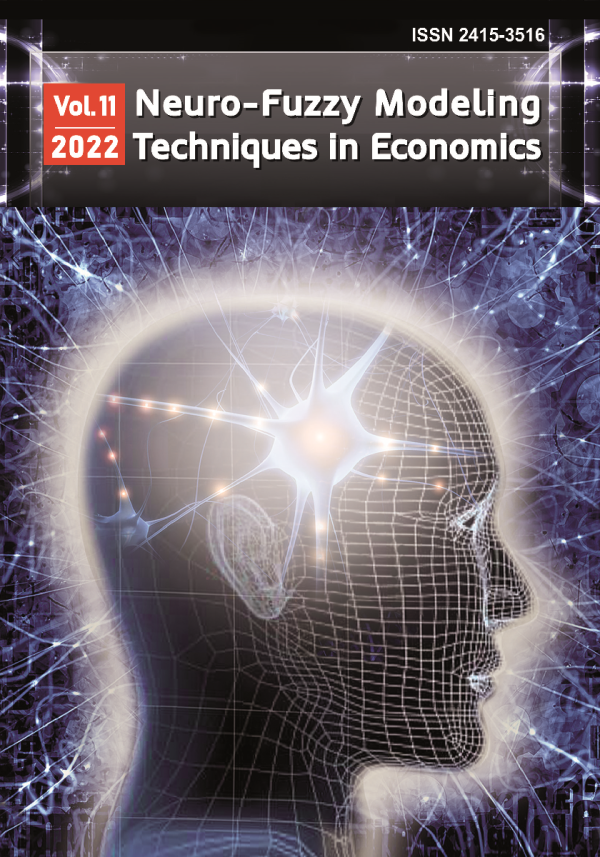
Neuro-Fuzzy Modeling Techniques in Economics
ISSN 2415-3516
Оцінка якості розвитку інформаційної економіки в республіці Азербайджан
The quality assessment of the development of information economy in the republic of Azerbaijan
DOI:
10.33111/nfmte.2018.111
Анотація: У статті досліджується проблема становлення і розвитку інформаційної економіки в Азербайджані. Констатується, що сьогодні в республіці розвиток інформаційно‐комунікаційних технологій визначений пріоритетною сферою в житті країни, і в цьому напрямку реалізуються численні стратегічні державні програми. Для оцінки їх ефективності інструментами нечіткої інтуїтивної логіки розроблено підходи розрахунку рівня розвитку інформаційної економіки. Результати дослідження показують, що темпи зростання інформаційної економіки в період за 2010–2016 роки не перевищували середній індекс розвитку. Також було визначено, що людські ресурси є основним фактором, який впливає на зростання доданої вартості у галузі. На підставі проведеного аналізу зроблено висновки про те, що зрушення в цій сфері є одним із найважливіших умов для сталого розвитку та подальшої інтеграції країни в глобальну економіку, визначено можливі напрямки для прискорення процесу становлення інформаційної економіки.
Abstract: The article devoted to problem of the formation and development of the information economy in Azerbaijan. It is stated that at present the development of information and communication technologies in the republic is defined as a priority area in the life of the country, and numerous strategic state programs are being implemented in this direction. To assess their effectiveness, approaches to calculate the level of development of the information economy using fuzzy intuitionistic logic tools have been developed. The results of the study show that the growth rate of the information economy in the period of 2010‐2016 did not exceed the average development index. It was also determined that the main factor affecting the growth of value added in branch is human resources. Based on the analysis, it was concluded that shifts in this area are one of the most important conditions for sustainable development and the subsequent integration of the country into the global economy, and possible directions for the acceleration of the information economy formation have been identified.
Ключові слова: інформаційна економіка, інформаційні комунікаційні технології, нечітка модель, людський капітал
Key words: information economy, information communication technologies, fuzzy model, human capital
УДК: 519.86+330.4
UDC: 519.86+330.4
JEL: C13 C45 C51 C52
To cite paper
In APA style
Imanov, G., & Hajizadeh, M. (2018). The quality assessment of the development of information economy in the republic of Azerbaijan. Neuro-Fuzzy Modeling Techniques in Economics, 7, 111-126. http://doi.org/10.33111/nfmte.2018.111
In MON style
Іманов К., Гаджизаде М. Оцінка якості розвитку інформаційної економіки в республіці Азербайджан. Нейро-нечіткі технології моделювання в економіці. 2018. № 7. С. 111-126. http://doi.org/10.33111/nfmte.2018.111 (дата звернення: 09.02.2026).
With transliteration
Imanov, G., Hajizadeh, M. (2018) Otsinka yakosti rozvytku informatsiinoi ekonomiky v respublitsi Azerbaidzhan [The quality assessment of the development of information economy in the republic of Azerbaijan]. Neuro-Fuzzy Modeling Techniques in Economics, no. 7. pp. 111-126. http://doi.org/10.33111/nfmte.2018.111 [in Ukrainian] (accessed 09 Feb 2026).
 # 7 / 2018
# 7 / 2018
Download Paper
600
Views
123
Downloads
2
Cited by
- Porat, M. (1977). The information economy: definition and measurement. Washington, DC: US Department of Commerce, Office of Telecommunications.
- Machlup, F. (1962). The production and distribution of knowledge in the United States. Princeton, NJ: Princeton University Press.
- The Organisation for Economic Co-operation and Development. (2001). Human capital. In Glossary of Statistical Terms. Retrieved from https://stats.oecd.org/glossary/detail.asp?ID=1264.
- United States Census Bureau. (2017). Informational industry. Retrieved from https://www.census.gov/cgi-bin/sssd/naics/naicsrch?chart_code=51&search=2017%20NAICS%20Search.
- Chen, Sh. (2016). Characteristic and development of information industry and its impact on the economy. In M. Li et al. (Eds.), Proceedings of 2015 2nd International Conference on Industrial Economics System and Industrial Security Engineering (Singapore), 9-18. DOI: 10.1007/978-981-287-655-3_2.
- Leontief, W. (1966). Input-output economics. New York, NY: Oxford University Press.
- The World Bank Institute. (2012). Knowledge Economy Index. Retrieved from https://datasource.kapsarc.org/explore/dataset/knowledge-economy-index-world-bank-2012/table/.
- Dutta, S., Lanvin, B., & Wunsch-Vincent, I. S. (2015). The Global Innovation Index 2015: Effective Innovation Policies for Development. Geneva, Switzerland: World Intellectual Property Organization. Retrieved from http://www.wipo.int/edocs/pubdocs/en/wipo_gii_2015.pdf.
- Morgenstern, O. (1963). On the accuracy of economic observations, 2nd ed. Princeton, NJ: Princeton University Press.
- Atanassov, K. (1986). Intuitionistic fuzzy sets. Fuzzy Sets and Systems, 20(1), 87–96.
- Wang, J. Q., & Li, J. J. (2009). The multi-criteria group decision making method based on multi-granularity intuitionistic two semantics. Science and Technology information, 33, 8–9.
- Li, L. (2016). A new entropy-based intuitionistic fuzzy multi-attribute decision making method. American Journal of Applied Mathematics, 4(6), 277–282.
- Sun, Ch., Jiao, H., & Ren, Y. (2014). Regional informatization and economic growth in Japan: an empirical study based on spatial econometric analysis. Sustainability Journal, 6, 7121–7141.
- State Statistical Committee of Azerbaijan Republic. (2005–2016). Retrieved from https://www.state.gov.az.

